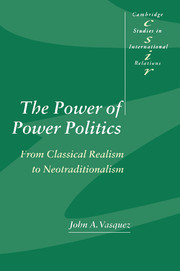Book contents
- Frontmatter
- Contents
- List of figures
- List of tables
- Preface
- Introduction
- Part I The Original Text: Classical Realism and Quantitative International Politics
- Part II Neorealism and Neotraditionalism: International Relations Theory at the Millennium
- 9 Retrospective: neorealism and the power of power politics
- 10 The promise and potential pitfalls of post-modernism: the need for theory appraisal
- 11 The realist paradigm as a degenerating research program: neotraditionalism and Waltz's balancing proposition
- 12 Mearsheimer's multipolar myths and the false promise of realist policy prescriptions: the empirical inaccuracy of the realist paradigm
- 13 Challenging the relevance and explanatory power of the realist paradigm: the debate on the end of the Cold War
- 14 Conclusion: the continuing inadequacy of the realist paradigm
- References
- Name index
- Subject index
- CAMBRIDGE STUDIES IN INTERNATIONAL RELATIONS
12 - Mearsheimer's multipolar myths and the false promise of realist policy prescriptions: the empirical inaccuracy of the realist paradigm
Published online by Cambridge University Press: 22 September 2009
- Frontmatter
- Contents
- List of figures
- List of tables
- Preface
- Introduction
- Part I The Original Text: Classical Realism and Quantitative International Politics
- Part II Neorealism and Neotraditionalism: International Relations Theory at the Millennium
- 9 Retrospective: neorealism and the power of power politics
- 10 The promise and potential pitfalls of post-modernism: the need for theory appraisal
- 11 The realist paradigm as a degenerating research program: neotraditionalism and Waltz's balancing proposition
- 12 Mearsheimer's multipolar myths and the false promise of realist policy prescriptions: the empirical inaccuracy of the realist paradigm
- 13 Challenging the relevance and explanatory power of the realist paradigm: the debate on the end of the Cold War
- 14 Conclusion: the continuing inadequacy of the realist paradigm
- References
- Name index
- Subject index
- CAMBRIDGE STUDIES IN INTERNATIONAL RELATIONS
Summary
The previous chapter examined one of the main areas of neorealism that has been researched by neotraditionalists and found it to be a degenerating research program. This chapter will examine a second area of Waltz (1979) that has been a focus of neotraditional attention – his discussion of bipolar and multipolar systems. This aspect of Waltz did not give rise so much to empirical research by neotraditionalists as it did to theorizing about the multipolar future that seemed to be emerging, and deducing from Waltz (1979) the policy implications of a possible system shift to multipolarity. The lack of a sustained research program means this area of inquiry is not susceptible to the charge of being degenerating. This does not imply, however, that all is well with this area of neorealism and the realist paradigm. Such an inference would be obviously fallacious. Rather the work must be appraised on its own terms and with the criteria that are most appropriate.
Theorizing and deducing from an exemplar for policy purposes is one of the hallmarks of realist scholarship, and the major path by which the empirical aspects of realist theory enrich the practical theory of realism. Classical realists, including Morgenthau (1970) himself, did this all the time with Politics Among Nations. Nuclear strategists did the same thing with nuclear deterrence theory.
The problem with this kind of deduction (and discourse) is that the empirical theory is often assumed to be true when there may be little evidence to support it.
- Type
- Chapter
- Information
- The Power of Power PoliticsFrom Classical Realism to Neotraditionalism, pp. 287 - 316Publisher: Cambridge University PressPrint publication year: 1999



